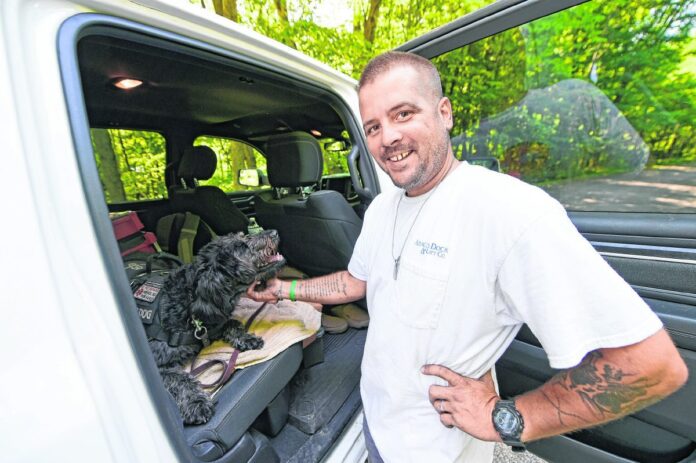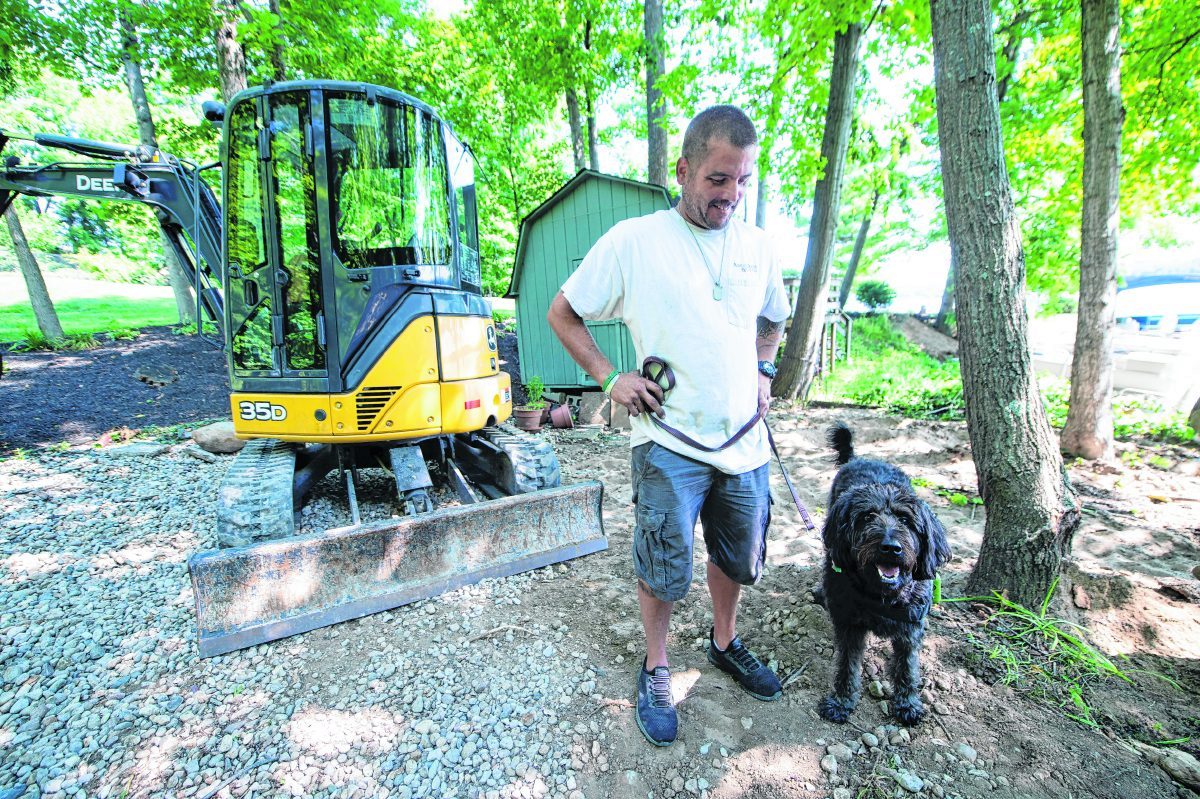
HANCOCK COUNTY — When Donny Roberts left the Army a few years ago after several deployments, he wasn’t in the best frame of mind.
“I was troubled and had some problems readjusting,” he said.
After trying to find his way on his own and through other popular self-help groups that assist people with addiction, Roberts was no better off.
“Nothing was clicking for me,” he said.
In a last-ditch effort, Roberts was introduced to the SMART Recovery program, an international self-help organization that uses a four-point, science-based program designed to empower people to confront their addictions.
The four points are building and maintaining motivation; coping with urges; managing thoughts, feelings and behavior; and living a balanced life.
“It completely changed my life,” Roberts said.

SMART, which is an acronym for Self-Management And Recovery Training, features mutual support groups. At meetings, participants help one another resolve problems with addictions. Groups focus on everything from drug use to over-eating.
The program helped get Roberts, who was on V.A. disability, to take control of his life. He is now employed, has a vehicle and supports himself.
“I feel like I have my life back,” he said. “The program has been tremendous for me.”
Roberts is now one of three facilitators in the county who lead local meetings with others who have addiction issues, helping them seek the same success he did through the program.
He was meeting with other veterans who were making progress until COVID hit in 2020, forcing the in-person meetings to go to online sessions, which was important for people in recovery.
While the internet gatherings were helpful and will be used again should they be needed, the local county SMART group is looking forward to getting back together on a regular basis. They are reaching out to invite those with addiction issues to join the program.
Donnie Vaughn has been a longtime program facilitator who has led numerous meetings and trained other group leaders. He said they meet from 9 to 11 a.m. Saturday mornings and 6 to 8 p.m. Wednesday evenings in a room at the Hancock County Public Library, but they’re looking for a more private location.
The SMART facilitators come out of the program, making them ideal to let others see the program really does work.
Founded in 1994 in the United States as a non-profit, non-religious organization to help people quit smoking, the SMART recovery program has grown and is in several countries with a large online presence. It is different from traditional 12-step programs in that it focuses on scientific methods rather than spiritual reliance on a higher power, as Alcoholics Anonymous does.
While anonymity is the motto of the in-person, cross-talk meetings — like those put on by AA — those who are a little unsure of visiting a live in-person session can go another route.
“A person who needs help can get online at any point in the day and find a group discussion on just about any topic,” Vaughn said.
Before COVID, the program had dozens of in-person members, but people have retreated since the pandemic, leading to only a handful of those in need attending the in-person sessions.
Organizers are trying to spread the word about the local SMART program because they know dealing with COVID and life in general nowadays is difficult to deal with for people with addictive personalities.
“We really can help,” Vaughn said. “We have tools to help people slow down their thought process to help them make better, the right decisions.”
Kevin Minnick, Hancock County probation specialist, oversees all the SMART facilitators in the United States and Canada and is an onsite trainer. Just last week he worked with facilitators at the New York Department of Corrections to help guide the organization.
“I’m kind of the Swiss Army Knife of the group,” he said.
He became aware of SMART Recovery and what it offered people when he worked for a hospital in the 1990s.
“SMART Recovery is a great alternative to 12-step type meetings,” Minnick said. “It’s not that those are not good programs, it’s just that they’re not for everyone.”
A friend of Minnick’s went through the program in Indianapolis, and she brought SMART Recovery to Hancock County in 2016. Minnick became the regional coordinator for Indiana in 2016 and took on more national duties shortly after.
He’d like to get participants of Drug Court, where he’s a support team member, to cross over and get into SMART Recovery as another tool to getting their lives back.
“This program is designed to help people to make better choices for themselves by using the tools that are proven, scientific and can help change a person,” Minnick said.
Local organizers are also trying to work with officials from the county jail and get people being released for addiction issues to want to be part of the program so they’ll have some support in their efforts to get on track.
Ryan Lammert is the county’s other facilitator for SMART Recovery. He’s been with the organization for a little over two years after Alcoholics Anonymous wasn’t helping him deal with certain issues.
“I needed something else to help me turn things around and I found a family with SMART,” Lammert said. “I love the academic approach they take.”
He described the program as one that gives a person tools to help in the decision-making process. Lammert likes being a facilitator because it helps him maintain a healthier approach to life while helping others.
“Whether you’re stuck in traffic or for, like me, I’m going through a big move right now, which is stressful and SMART helps you stay grounded and think things through on a rational approach,” Lammert said.
He likes being a facilitator for the same reasons one might hold a door open for another, “it feels good,” Lammert said. “It’s a great way to maintain a healthier approach for life.”
[sc:pullout-title pullout-title=”How to get help” ][sc:pullout-text-begin]
SMART Recovery is one of several programs and providers in Hancock County that are available to those who are battling addiction. Here’s where you can get help:
Hancock Counseling & Psychiatric Services
120 W McKenzie Rd, Suite F, Greenfield
317-468-6200
Community Health Network Behavioral Health
145 Green Meadows Dr., Suite 1, Greenfield
317- 621-5719
The Jane Pauley Community Health Center
1107 N. State St., Greenfield
317-477-5263
Families First
98 E. North St., Greenfield
317-462-3733
Mental Health Partners
98 E. North St., Greenfield
317-462-2877
Here’s a partial list of support groups that also are available to help those struggling with addiction
The Landing Place teen recovery program
Education and treatment/12-step workshops/prevention.
Ages 13-19. NA and AA available.
Healing Hearts program for families and friends of loved ones in addiction.
18 W. South St., Greenfield
317-525-7791
Celebrate Recovery at Brandywine Community Church
Thursdays 6:30-8:30 p.m.
1551 E. New Road, Greenfield
317-462-4777 x104
SMART Recovery Hancock County
Self-empowering addiction recovery support group for adults over age 18.
The Way Out Club
AA, NA, and Al-Anon meetings available
226 Cherry St., Greenfield
317-468-0082
MORE HELP AVAILABLE
Hancock Health’s Healthy365 System of Care is a collaborative support system for youth and families who need help with mental health and/or substance abuse treatment. Here’s where to turn for more information:
On the web: www.behealthy365.org/about/system-of-care/
By phone: 317-468-4231
Email: [email protected]
[sc:pullout-text-end]




